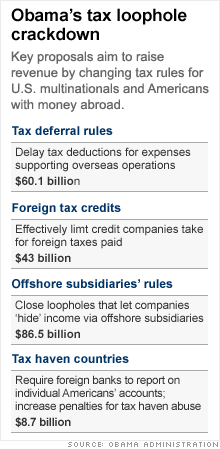Will Obama tax plan really save jobs?
President says his proposals to change tax breaks for U.S. multinationals will spur employment. Experts don't think so.

NEW YORK (CNNMoney.com) -- President Obama says his proposals to crack down on corporate tax loopholes will do a lot of things, including create more U.S. jobs.
"We will stop letting American companies that create jobs overseas take deductions on their expenses when they do not pay any American taxes on their profits," Obama said when announcing his proposals.
In turn, Obama said, the government would offer a tax cut to companies that do their research and development in the United States. And that will "jump-start job creation," he said.
Will it work? Tax policy experts and corporate lobbyists are dubious. They say that his proposals, if implemented, could raise revenue for the government but are not likely to spark an increase in U.S. jobs.
Among the changes Obama wants is to require U.S.-based multinationals to defer taking deductions on expenses related to their foreign operations until they bring back the profits to the United States and pay U.S. income tax on them.
Doing so would reduce some of the tilt in the tax code that makes it more advantageous for companies to invest abroad, said one Democratic aide on Capitol Hill.
But U.S. tax policy is not the only factor a company weighs in deciding whether to invest beyond the borders.
For instance, companies go abroad primarily to sell products abroad, said Rosanne Altshuler, co-director of the Tax Policy Center. In 2006, she noted, only 10.5% of sales of U.S. controlled foreign subsidiaries were sent back to the United States.
"And there are a lot of advantages to having the production close to the place of final sale," Altshuler said. One is lower transportation costs.
Indeed, total manufacturing cost is the most compelling reason to move operations abroad, and countries actively woo companies with tax holidays and other incentives, said Sang Kim, a partner in international tax practice of the global law firm DLA Piper. Kim's practice doesn't lobby, but DLA Piper does and a company representative said it might do so on Obama's proposals.
"Even if all this passes, will it create factories in the United States? Absolutely not," Kim said.
Some say Obama's plan won't create jobs because tax policy has a limited influence on jobs.
"Employment is determined by overall demand for goods and services, not by targeted tax and spending provisions," Eric Toder, a fellow at the liberal Urban Institute and former assistant secretary of tax analysis for the Treasury Department, wrote in the Tax Policy Center's blog Tax Vox.
The proposal that the president leans on most heavily as an engine for job-creation is his call to make permanent the credit for companies that do their R&D in the United States.
Even critics of Obama's proposals like the idea because it would create greater certainty in companies' planning and because it reduces the net cost of hiring.
But, they say, companies weren't really worried about losing the credit because lawmakers have renewed it annually. So making it permanent is unlikely to have a robust effect on hiring plans, especially since the president's other proposals would likely result in a higher tax bill for U.S. multinationals.
Critics also contend that increasing the tax bite on U.S. companies will put them at a disadvantage with their foreign competitors. That could make it more appealing for a U.S. company to become foreign owned if it means a lighter tax burden.
And ultimately, they say, that could mean a loss of U.S. jobs.
"The damage [over time] to the U.S. as a significant player in the world would be considerable," said Gary Clyde Hufbauer, Reginald Jones senior fellow of the Peterson Institute. "It would erode U.S. production structures abroad."
Hufbauer also notes, however, that foreign companies provide roughly 6 million jobs in the United States. That suggests that even if some U.S. companies were to be bought by foreign competitors, overall employment might not fall.
For instance, the decline in U.S. manufacturing employment is down among U.S.-owned manufacturers, a 2008 report by the Joint Committee on Taxation noted.
"But the decline has been largely offset by employment at foreign-owned manufacturing facilities located in the United States." ![]()

